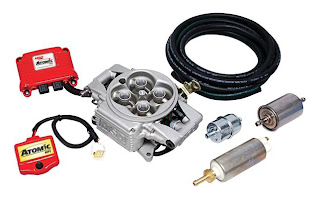 |
| Fuel System Troubles |
Experience gained in operating automotive engines has shown that most engine troubles rest with the fuel system. The more common fuel system troubles are fuel leaks through badly sealed fuel line connections, air leaks past air cleaners and filters, and clogged fuel lines and filters. Besides, carburetor engines may suffer from carburetor troubles resulting in inadequate air-fuel mixture composition (too lean or too rich); diesel engines may develop troubles due to air finding its way into the fuel lines, poor atomization of fuel by the fuel injector, or wrong injection timing.
Such trouble may cause hard starting, lack of power, misfiring, smoky exhaust, or sudden stalling.
Fuel leaks can be detected by visual injection. The leaks, if revealed, are eliminated by tightening up the leaky connections or by replacing defective gaskets.
If the engine does not start, the first thing to do is to make sure that there is fuel in the tank and that the fuel shut-off cock is open. Then check the operation of the fuel (transfer) pump and make sure that the fuel lines and filters are not clogged. Use a tire pump to clear clogged fuel lines, if any. Next check the carburetor (if your engine uses one) for clogged jets. Use a tire pump to clear clogged carburetor jets, if found. Never use wire to do the job. For this may damage jet orifices.
A diesel engine will not start if air gets into the fuel system, for in this case, the fuel-injection pump will compress air bubbles in its barrels instead of delivering fuel into the engine cylinders. Should this prove to be the case, bleed the fuel system, using the hand primer pump. Expel air first from the primary fuel filter, then from the secondary fuel filter, and finally from the fuel-injection pump head.
Wrong injection timing may also be the cause of hard starting. Therefore, check for this condition as well and make corrections, if necessary.
Should all the above corrective measures prove to be no help, check the fuel injector for spray pattern and injection pressure, and replace any one found to be defective. Still better, replace the injectors outright, if spares are available.
If a diesel engine lacks power and, in addition, misses or has a smoky exhaust, one should first of all locate the cylinder that is most responsible for these troubles. To do this, disconnect each fuel injector in turn from the fuel-injection pump. This can be done by backing off 1. 5 to 2 turns the injection-line union nuts on the pumping elements. The disconnection of any injector, except for the one in the misfiring cylinder, will affect the operation of the engine.
Loss of power that is not coincidental with an increased exhaust density is most probably caused by clogged fuel filter or worn pump plunger-and-barrel or injector nozzle-and-needle-valve assemblies. Therefore, the first thing to do in this case is to check the primary and secondary fuel filters and wash their filter elements, if necessary.
A reduction in engine power not attended by a smoky exhaust may be caused by a faulty fuel injector, clogged air cleaner, or incorrect injection timing. So, check the air cleaner and, if necessary, wash the oil path and screen filters with diesel fuel. Fill the bath with fresh oil. Check and adjust (if necessary) the injection timing.
Never disassemble the fuel injectors or fuel-injection pump under field conditions. Any operations involving the disassembly of these units can only be done by skilled mechanicians at specialized shops.
In carburetor engines, loss of power, resulting from defects in the fuel system, is due to an air-fuel mixture that is either too lean or too rich.
A lean mixture condition may result from either too little fuel or too much air in the combustible charge. The amount of fuel in the charge may be reduced because of clogged fuel tank air vent, clogged fuel lines, filters or carburetor fuel jets, defective fuel pump or too low fuel level in the carburetor float chamber. An increased amount of air in the charge may be due to carburetor body and intake manifold air leaks.
The clogged fuel tank air vent should be cleared from dirt or ice (in winter time). Clogged fuel filters should be disassembled, cleaned and washed in clean gasoline. Damaged fuel pump diaphragms should be replaced. Poorly fitting fuel pump valves should be cleaned and, if necessary, replaced. Air leaks should be eliminated by tightening the carburetor body and intake manifold fasteners or by replacing damaged sealing gaskets.
A rich mixture will also cause a loss of power. Excessive quantities of fuel will not vaporize and burn completely. Liquid fuel washes the lubricant from the cylinder walls, allowing the piston rings to make metal-to-metal contact. Scuffed rings and excessive oil and fuel consumption will result.
An excessively rich mixture may result from defects in the carburetor and also from too high a fuel pressure which forces the carburetor needle valve off its seat, causing flooding.
An engine may show a loss in power when unfiltered-air enters the cylinders, causing increased wear in the piston rings and cylinder liners. Pistonring wear results in poor compression, hard starting and increased exhaust smoke density. Therefore, the engine should be systematically checked for air-intake leaks.
A diesel engine will race (i. e., develop excessively high speed) if there is too much oil in the governor housing or in the oil bath of the air cleaner, or else if the fuel control rack or some governor components are frozen. In this case, the engine must be stopped and the condition causing the trouble must be remedied.










It's always a pleasure to read your magnificent articles on this site. You are among the top writers of this generation, and there's nothing you can do that will change my opinion on that. My friends will soon realize how good you are.
ReplyDeleteauto parts manufacturing companies in china